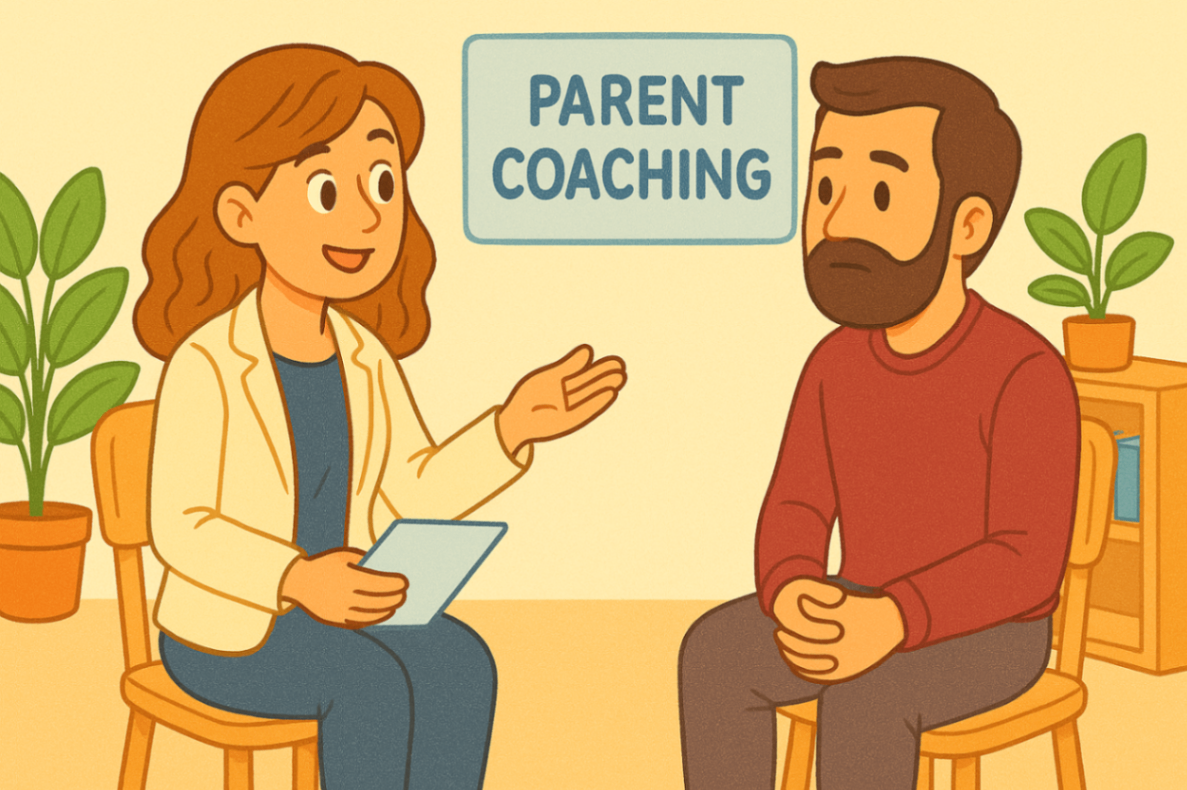
why ndis behaviour support should include parent coaching
24 June, 2025

Key Highlights
-
Parent coaching under NDIS Behaviour Support equips families to manage behaviours of concern effectively at home.
-
Often overlooked, parental involvement is vital in fostering a person’s quality of life and achieving lasting positive outcomes.
-
Combining parent coaching with existing strategies can minimise restrictive practices and boost emotional well-being across all age groups.
-
An effective NDIS therapy team fosters skill development and enhances team communication, strengthening the participant’s support framework.
-
Parent training aligns with the NDIS Quality and Safeguards Commission’s commitment to person-centred approaches.
-
Early coaching interventions provide a strong base for a more effective positive behaviour support plan.
Introduction
Imagine a home where challenging behaviours are met not with stress, but with care and practical strategies. This is what parent coaching within an NDIS therapy team can offer. Behaviour support workers can empower parents and carers with the skills to confidently respond to difficult behaviours—ultimately helping children become more independent.
By working closely with families, carers, and schools, practitioners create lasting change. That’s why it’s time to make parent coaching a central component of every positive behaviour support plan under the NDIS—especially in communities across Liverpool, from Casula and Prestons to Wattle Grove, Moorebank, and Lurnea.
Understanding NDIS Behaviour Support in Australia
 In Australia, NDIS behaviour support is designed to improve quality of life for individuals with disabilities by identifying and reducing behaviours of concern. These plans promote positive strategies and seek to avoid restrictive practices unless absolutely necessary.
In Australia, NDIS behaviour support is designed to improve quality of life for individuals with disabilities by identifying and reducing behaviours of concern. These plans promote positive strategies and seek to avoid restrictive practices unless absolutely necessary.
A collaborative NDIS therapy team, which includes the participant, family members, behaviour support practitioners, and allied health providers, is essential in crafting plans that work. In areas like Liverpool and surrounding suburbs—including Chipping Norton, Miller, and Green Valley—this collaborative approach is already changing lives.
Explore how we tailor positive behaviour support plans in Liverpool to meet each family's needs.
Key Principles of NDIS Behaviour Support
A well-developed positive behaviour support plan revolves around:
-
Understanding behaviours of concern in context
-
Prioritising early intervention
-
Ensuring strategies align with family values and routines
-
Reducing reliance on restrictive practices
These principles follow the NDIS Quality and Safeguards Commission’s standards and work best when families receive targeted parent training.
Current Approaches and Limitations
While ways used in NDIS Behavior Support have made good progress, there are still some problems. Many times, the plans are about the professionals and do not involve parents or carers much. But parents and carers are important because they spend a lot of time with the person and help get the best results day-to-day. Some of the existing solutions rely on restrictive practices like seclusion or mechanical restraints, and the use of these can limit someone's freedom of movement. This shows that there is a need for other, better options.
|
Approach |
Limitation |
|---|---|
|
Restrictive Practices |
Intrusive and compromises freedom of movement |
|
Interim Behavior Plans |
Sometimes lacking depth due to time constraints |
|
Behavior Assessments |
May overlook the environment’s role or family dynamics |
When parent coaching is added, it can close these gaps. This kind of help works for the long term and can make people less likely to use restrictive methods. Involving carers, parents, and families more supports freedom of movement and allows people to get better results from ndis behavior support.
The Role of Parents in NDIS Behaviour Support
Parents are not just observers—they are key partners in delivering consistent support. They provide daily insights into what works and what doesn’t. Including Liverpool parent coaching as part of a child’s NDIS plan ensures home-based strategies align with the plan’s therapeutic goals.
This hands-on involvement results in more successful positive behaviour support plans and helps reduce reliance on restrictive interventions.
Understand how coaching helps parents support their child: NDIS Parent Training: Why It Matters for Your Child’s Progress
Why Parent Involvement Matters
-
Parents boost emotional resilience and self-regulation in their children.
-
Parent training builds family confidence in addressing behaviours.
-
Early response to behaviours of concern limits escalation.
-
Collaboration between families and professionals ensures consistency.
When families from suburbs like Hoxton Park, Cartwright, and Ashcroft are part of the plan, outcomes improve dramatically. That’s why Liverpool parent coaching isn't optional—it’s essential.
Outcomes When Parents Are Excluded
When parents are left out of the process:
-
Plans may miss crucial behavioural triggers seen at home.
-
Emotional wellbeing declines due to lack of stable, daily support.
-
Behavioural issues may worsen without consistent home strategies.
-
Support teams become fragmented, often defaulting to restrictive practices.
To avoid this, a connected NDIS therapy team that includes parents ensures each plan is stronger and more sustainable.
What Is Parent Coaching in Behaviour Support?

Parent coaching in behaviour support is about giving training and tips to parents. It helps them understand and use the best ways to help their child at home. This kind of teamwork helps parents know what their child needs. It also helps children show good behaviour. When parents work with behaviour support, it makes programs work better and brings good results for their child.
Definition and Core Components
Parent coaching is a special approach that helps families turn behavior support ideas into simple steps you can use every day. Its main parts are:
-
Helping parents build good communication skills. This lets them understand their child better and talk about their needs in the right way.
-
Looking at what the child needs as a whole, with focus on teaching useful skills instead of just reacting to problems.
-
Creating better changes in families by getting rid of triggers and making more helpful spaces at home.
-
Making the connection stronger between parents, the professionals who help, and the child, so things can keep getting better in the future.
With coaching that fits each family and support from behavior specialists, these parts help your child become more independent and raise their quality of life.
How Parent Coaching Differs from Traditional Support
Traditional support often occurs in clinical settings, with little carryover into home life. Parent coaching, however, equips families to apply therapeutic strategies where it matters most—at home, in school routines, or in community outings.
By shifting from reactive to proactive approaches, parent coaching ensures that support continues beyond therapy sessions—building lasting independence and confidence for the child.
Benefits of Including Parent Coaching in NDIS Behaviour Support
Including parent coaching within a positive behaviour support plan:
-
Makes parents equal contributors in the NDIS therapy team
-
Improves long-term outcomes for children with behaviours of concern
-
Ensures day-to-day routines align with therapeutic goals
-
Reduces the use of restrictive practices
-
Strengthens family relationships
This collaborative approach is especially important for families navigating NDIS services in diverse Liverpool suburbs such as Busby, Warwick Farm, and Mount Pritchard.
Conclusion
Empowering families through parent coaching is one of the most effective ways to improve behaviour support under the NDIS. It promotes better communication, shared understanding, and consistent strategies—all of which lead to stronger outcomes for children.
If you're a parent looking for support in suburbs across Liverpool—from Glenfield to Hammondville—DAAR is here to help you become an integral part of your child’s growth.
Book your appointment now to see how our NDIS therapy team can include you in a tailored positive behaviour support plan.
Frequently Asked Questions
How can parent coaching be included in an NDIS plan?
To include parent coaching in an NDIS plan, the participant, support coordinator, and behavior support practitioner need to work together. They should talk about the coaching needs when they review the plan. This way, practitioners can make coaching strategies that fit parents better. These steps help parents do more for NDIS participants and improve their lives.
What can I expect in a session?
A parent coaching session helps you learn ways to give behavior support. In these sessions, you also work on your communication skills and learn what triggers the person you care for. The support team and carers join in to work with you. They help make sure that everyone uses the same approach. This is important to keep up good NDIS quality and to help people with behaviors of concern do better.
How do I find NDIS providers that offer parent coaching?
It is easy to find providers. You can use the NDIS behavior support practitioner application. You can also email them. Another way is to look at PDFs from well-known groups in the disability sector. Make sure every provider matches the NDIS Commission's rules. They should give full support and good coaching for parents.
Is parent coaching part of NDIS?
Yes, parent coaching matches the NDIS rules set by the Safeguards Commission. It works well with full behavior support plans. These plans are made for people of all ages. Parents, support workers, and others helping out use these plans. The goal is to get better, lasting changes for people who show challenging behaviors.
.svg)

















